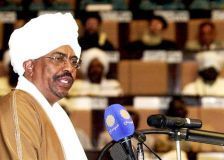Sudanese president suggests power sharing
KHARTOUM, Sudan, Jan 2, 2005 (AP) — Encouraged by the signing of a peace deal with southern rebels, Sudan’s president suggested Saturday that he may hold power and wealth sharing talks with rebels fighting army forces in the western region of Darfur.

|
|
Sudanese President Omar El-Bashir addresses the national assembly in Khartoum Saturday, Jan. 1, 2005. (AP). |
Thousands of Sudanese turned out in the capital, Khartoum, to welcome the return of the government delegation that negotiated the deal in the Kenyan city of Naivasha on Friday to end the 21-year southern civil war.
Opposition groups also embraced the peace accords and cease-fire agreement signed by government officials and southern rebels.
The agreements cleared the way for warring sides to sign a comprehensive peace deal next month in the Kenyan capital, Nairobi.
South African President Thabo Mbeki, who witnessed the deal signing in Naivasha, also was greeted by 50,000 people in Darfur, the site of a separate conflict in western Sudan that has killed tens of thousands of villagers since fighting started in February 2003.
U.S. and Sudanese officials hope the momentum behind the peace deal to end the southern war will help steer rebels and the Sudanese government, which is believed to be backed by Arab militiamen known as the Janjaweed, toward a similar result in Darfur, a region roughly the size of France.
President Omar el-Bashir urged all Sudanese — particularly opposition groups — to engage in a comprehensive reconciliation and work to end the Darfur crisis.
“We call upon all the sons of Sudan, inside and outside, to embrace peace, to listen to the voice of wisdom and to give priority to dialogue by making it the only path to solving our problems,” the president said in his annual speech to the Sudanese parliament marking his country’s independence from British rule.
El-Bashir, wearing a traditional white headdress and brown gown, also indicated he was willing to enter into power- and wealth-sharing negotiations with Darfur rebels as he did with his southern adversaries.
Sadiq el-Mahdi, the leader of Umma, Sudan’s largest opposition party, told state-run Omdurman radio that the Naivasha accords represented “a big step toward establishing democracy and a just peace.”
El-Mahdi, the country’s last democratically elected prime minister who was overthrown by el-Bashir in 1989, called on all Sudanese political parties to endorse the peace plan.
Bashir Adam Rahma, head of the Islamic-oriented opposition Popular Congress party, also described the accords as “a new birthday for Sudan,” but said unresolved issues remained, including the government’s use of strict state of emergency laws imposed by el-Bashir after he seized power.
Peace in Sudan “is not complete without signing another agreement that brings stability and security” to Darfur, Rahma added.
Tajelsir Mohammed Saleh, a senior member of the moderate opposition Democratic Unionist party, pressed for the release of the agreement’s details.
The newly signed agreement details protocols on sharing legislative power and natural resources, changing the armed forces during a six-year transition period, and methods to administer three disputed areas in central Sudan.
Sudan’s two-decade civil war pitted the Khartoum government, led by Arab Muslims who dominated the north, against rebels made up mainly of Christians and animists, who are the majority in the south. The conflict is blamed for more than 2 million deaths, primarily from war-induced famine and disease.
